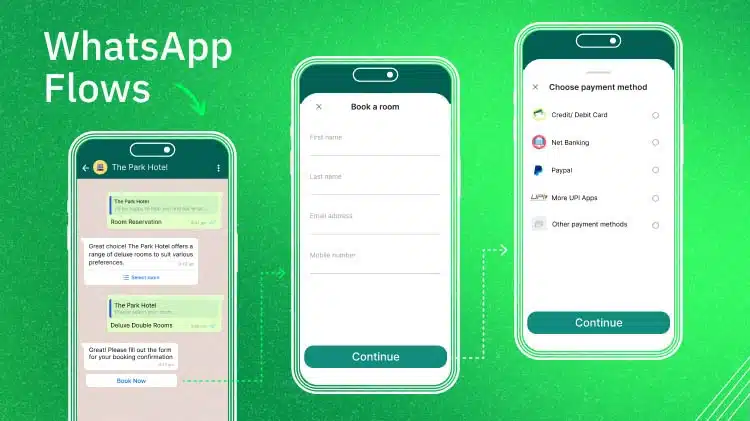
WhatsApp for Schools: Simplify Communication Between Teachers, Students & Parents
Learn how schools use WhatsApp to connect teachers, parents, and students. Save time, reduce costs, and automate updates with Botcake.
Introduction
With instant updates, quick alerts, and easy sharing, schools can improve communication and save time. That’s why it is becoming more important today.
Why WhatsApp is becoming the go-to communication tool for schools
Parents and students already use WhatsApp every day, so schools don’t need to push a new platform. Using WhatsApp makes it faster to share updates and easier to engage without extra training.
Key challenges in school communication and how WhatsApp solves them
Old ways like printed notices, phone calls, or emails often cause delays or missed messages. WhatsApp solves this by sending messages right away. It also shows who has read them and keeps a record. This way, communication stays clear and reliable.
Benefits and Challenges of Using WhatsApp for School Communication
Before diving into the challenges, let’s first look at the key benefits schools gain from using WhatsApp.
Benefits
Real-time communication between teachers and parents
WhatsApp allows teachers and parents to stay connected instantly. Instead of waiting for parent-teacher meetings or phone calls, schools can send direct updates in real time. This creates faster feedback loops and helps address student needs more effectively.
Easy sharing of homework, announcements, and circulars
Schools can share documents, homework, and notices as PDFs, Word files, or images directly on WhatsApp. This cuts out delays from paper notes and makes sure parents always get the right information. Businesses managing schools save printing costs and reduce administrative work.
Enhanced student engagement through reminders and updates
Students respond better when reminders are delivered on a familiar platform. Whether it’s about homework, school trips, or contests, timely reminders help students take part more actively. For businesses, this increases the overall effectiveness of educational programs.
Reduces dependency on paper-based or outdated tools
Using WhatsApp also saves money by reducing the need for printing notices, sending letters, or posting on boards. Schools move to digital communication, which is faster, more reliable, and environmentally friendly. This shift also helps businesses streamline their communication systems.
Challenges & Considerations
Managing large group dynamics
When groups involve hundreds of parents, it’s easy for messages to get lost in the noise. Schools need clear group rules, like giving posting rights only to teachers or admins, so communication stays focused.
Balancing automation with personal communication
Automated reminders help save time, but private talks, such as behavior or academic issues, should be handled one-on-one. Schools must find the right balance to maintain trust while still using automation for efficiency.
Ensuring digital discipline and etiquette
Clear rules also stop unnecessary chats, the spread of wrong information, or off-topic messages. By setting these rules early, schools can keep groups professional and in line with their goals.
Practical Use Cases of WhatsApp for Schools
Class updates and homework reminders
Teachers can post daily assignments or updates in class groups. This helps parents track learning and ensures students don’t miss tasks. Schools can also use broadcast messages to share homework or updates regularly. Tools like Botcake.io make it easy to schedule and manage these messages.
Attendance alerts to parents
Automated systems can link attendance with WhatsApp and send quick alerts to parents when a student is absent. This reassures parents about safety while helping schools reduce truancy issues.
Exam schedules and results announcements
Exam timetables and results can be shared directly with students and parents. This avoids confusion, reduces repeated queries, and ensures everyone gets updates at the same time.
Fee reminders and payment confirmations
Schools can send reminders about upcoming due dates, along with digital payment links. After parents make a payment, they get an instant confirmation on WhatsApp, so the process is clear and easy.
Sharing photos and videos from school events
Parents who cannot attend events can still experience them through photos and videos shared on WhatsApp. This improves parental involvement and creates stronger connections with the school community. For example, schools can use WhatsApp messages to encourage parents and students to join courses and extracurricular activities. Collecting registration information is one of the most effective features on WhatsApp, especially for businesses that excel in conversational engagement.

Emergency notifications (weather closures, health alerts)
In urgent cases like bad weather, transport problems, or health notices, schools can use WhatsApp to send updates right away. This reduces risks and ensures all parents receive critical information on time.
WhatsApp Features That Are Useful for Schools
Group chats for each class or subject
Dedicated groups help teachers communicate with specific classes or subjects. For example, a math teacher can share assignments only with their own students, so the main school group doesn’t get crowded.
Broadcast lists for school-wide updates
Broadcast lists allow schools to send one-way messages to many parents without creating group chats. This works well for official notices, holiday updates, or school-wide reminders where no reply is needed.
WhatsApp Catalog for showcasing school services or programs
Schools can use the catalog to show information about clubs, after-school activities, and admission options. This provides parents with a quick, organized way to view available services directly inside WhatsApp. They can share short details, send signup forms, and sync leads to their CRM for easier management. All of this can be done using third-party tools like Botcake.
Labels to manage inquiries (Admissions, Transport, Fees, etc.)
With labels, schools can sort chats into groups like “Admissions,” “Transport,” or “Fees.” This helps staff manage communication more efficiently and ensures parents receive quicker responses.
Status feature to post daily school highlights
Schools can share daily highlights, motivational messages, or quick reminders through WhatsApp Status. Parents and students can check updates directly, so the school doesn’t have to message everyone one by one, which helps avoid overload.
Setting Up WhatsApp for School Use
Use WhatsApp Business for structured messaging
The WhatsApp Business app offers tools tailored for organizations. It allows schools to send quick updates like fee reminders, holiday notices, or emergency alerts. Of course, these messages are easy to see and reliable. Schools can also create a professional profile, which builds trust and helps manage communication in an organized way.
Assign one or more school staff to manage communications
Assign dedicated staff members to oversee WhatsApp messaging. These admins ensure that messages are consistent, timely, and relevant. In addition, they can step in when a personal response is needed, especially for more complex or sensitive talks where a human touch is important.
Create groups responsibly with clear rules & admin guidelines
When creating class or subject groups, clarity is key. Set guidelines: who may post, what content is allowed, and appropriate response etiquette. This keeps communication focused and avoids noise, especially important as group size grows.
Set up quick replies and automated messages for common queries
Quick replies and auto-messages can save time. Schools can pre-complete responses for FAQs such as school hours, transport details, or upcoming events. This ensures uniform, instant answers even when staff are unavailable.
WhatsApp for Admissions & Onboarding
Schools can use WhatsApp to send prospectuses, share virtual tours, schedule interviews, and send reminders. After admission, automated onboarding messages provide schedules, fees, and contacts, helping families settle in smoothly.
Tools & Integrations for Scaling WhatsApp in Schools
WhatsApp API for large-scale automation
For bigger schools, the WhatsApp Business API lets them send messages safely and connect with their admin systems. Schools can automate alerts for attendance, exam dates, fee reminders, and emergencies while keeping messages secure and workflows smooth.
Education CRM tools with WhatsApp integration (Leadsquared, Zoho)
CRMs like Leadsquared and Zoho can connect with WhatsApp, so schools can handle inquiries, leads, and messages all in one place. This offers better tracking, stronger follow-up, and a seamless workflow from inquiry to admission.
Chatbot platforms for FAQs and inquiry handling (Botcake, WATI, Twilio)
Chatbot tools like WATI or Twilio can answer common questions automatically. These can include questions about fees, class times, or exams. This lets staff focus on urgent or more complicated issues.
Integrate Pancake.biz and Botcake for better messaging management and automation:
- Pancake.biz brings all WhatsApp chats together with a CRM. This helps schools handle admission questions, track messages, and automate tasks easily on one platform. Pancake is also one of the first partners to integrate the WhatsApp API, making it easier for schools to connect and manage conversations.
- Botcake works with this by using AI to automate chats. It can manage bulk messages, answer FAQs, and guide conversations. This saves time and makes responses faster.
Conclusion
WhatsApp for schools makes communication faster, clearer, and more organized between teachers, parents, and students. From sharing updates and reminders to managing admissions and emergencies, it saves time and improves engagement. By using tools like Botcake and Pancake.biz, schools can automate tasks, handle inquiries efficiently, and ensure smooth communication. Start using WhatsApp today to simplify school interactions and keep everyone connected.
Related blogs
LINE Chatbot: Guide to Business Automation in Asia 2026
How AI Changes Customer Experience: A Complete Guide
WhatsApp Flows: Revolutionizing Conversational Experiences on the World's Favorite Messaging App
Discover how your business can connect with customers 24/7 with Botcake
- Automate your customer messaging flow
- React thousands with bulk marketing message campaigns
- Blend AI power seamlessly with your customer service


